2021-2022学年牛津译林版英语九年级下册Unit3-4Grammar总结-从句和简单句的转换课件(共14张PPT)
文档属性
| 名称 | 2021-2022学年牛津译林版英语九年级下册Unit3-4Grammar总结-从句和简单句的转换课件(共14张PPT) |
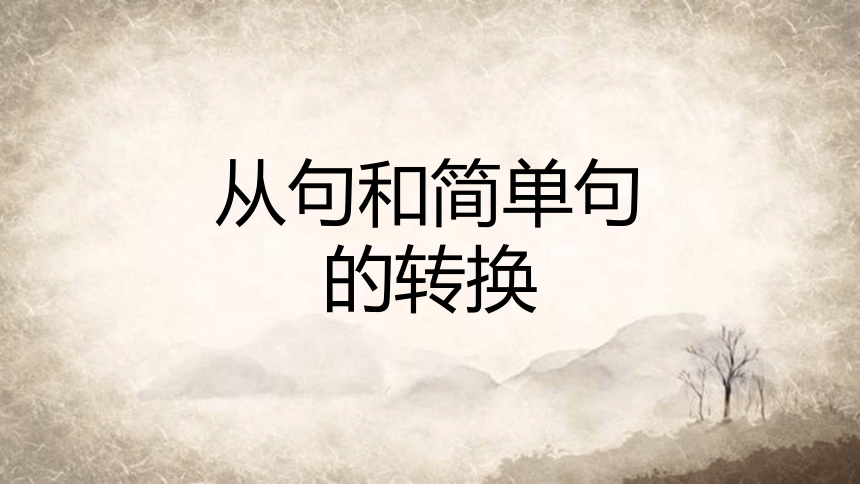
|
|
| 格式 | zip | ||
| 文件大小 | 109.1KB | ||
| 资源类型 | 教案 | ||
| 版本资源 | 牛津译林版 | ||
| 科目 | 英语 | ||
| 更新时间 | 2022-02-17 00:00:00 | ||
图片预览

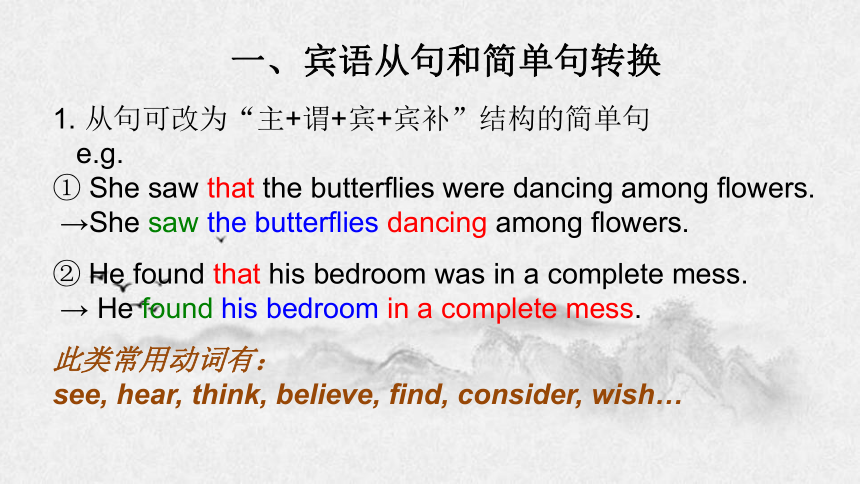
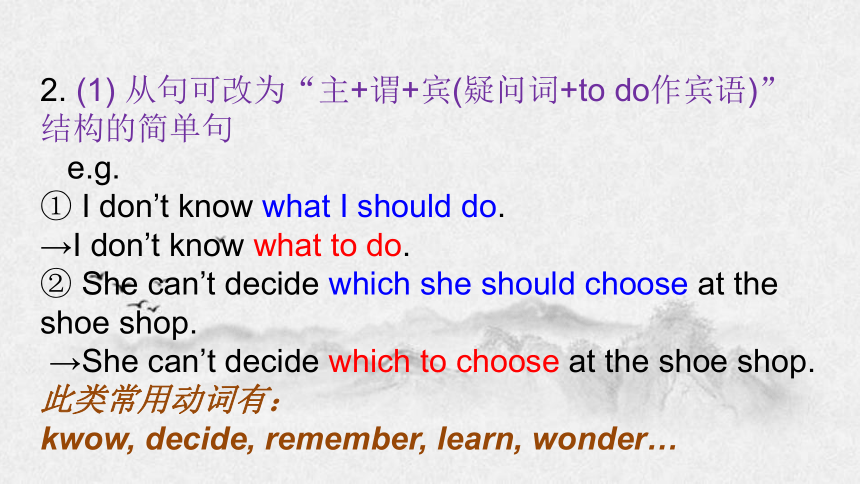
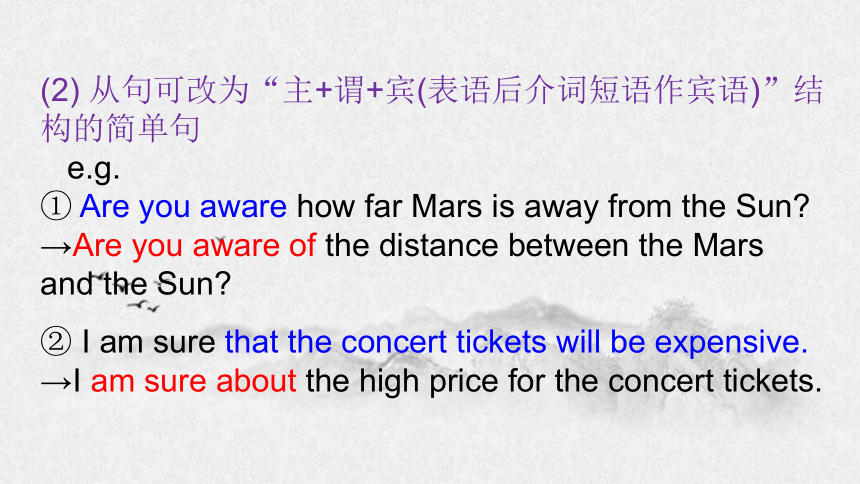
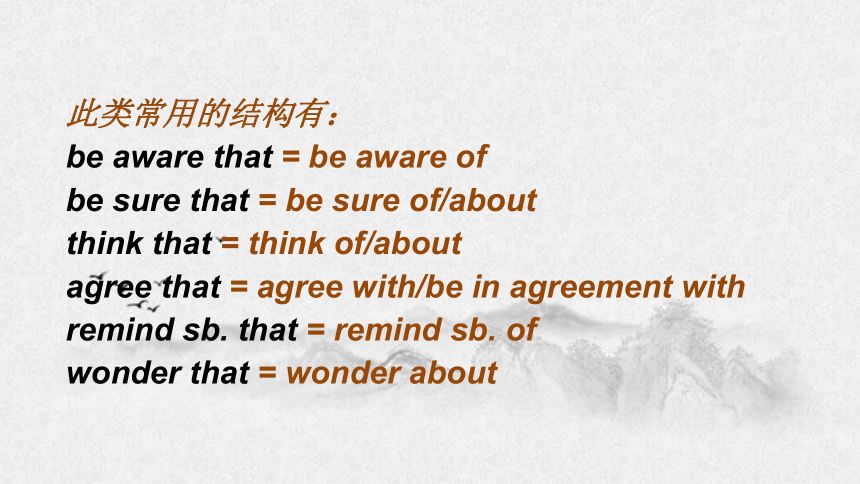
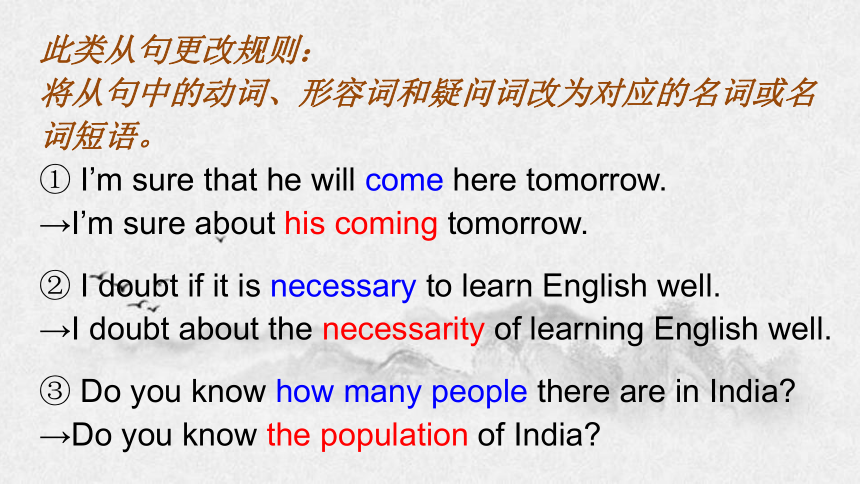
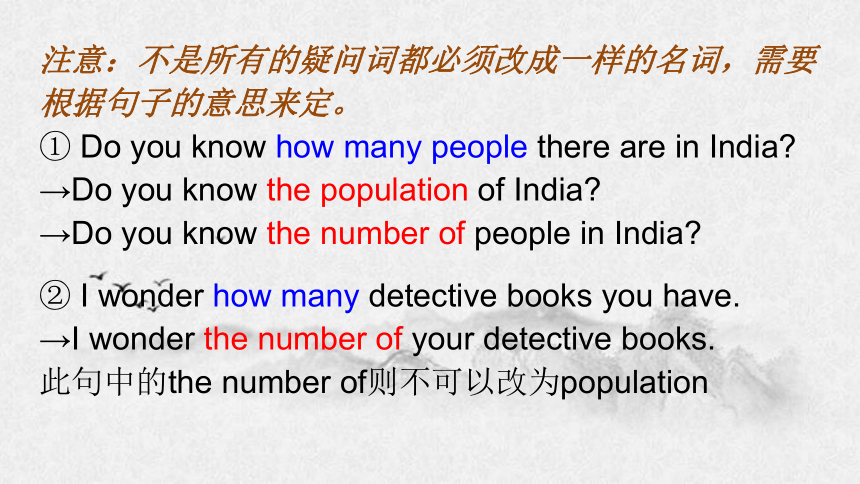
文档简介
(共14张PPT)
从句和简单句
的转换
一、宾语从句和简单句转换
从句可改为“主+谓+宾+宾补”结构的简单句
e.g.
① She saw that the butterflies were dancing among flowers.
→She saw the butterflies dancing among flowers.
He found that his bedroom was in a complete mess.
→ He found his bedroom in a complete mess.
此类常用动词有:
see, hear, think, believe, find, consider, wish…
2. (1) 从句可改为“主+谓+宾(疑问词+to do作宾语)”结构的简单句
e.g.
① I don’t know what I should do.
→I don’t know what to do.
② She can’t decide which she should choose at the shoe shop.
→She can’t decide which to choose at the shoe shop.
此类常用动词有:
kwow, decide, remember, learn, wonder…
(2) 从句可改为“主+谓+宾(表语后介词短语作宾语)”结构的简单句
e.g.
① Are you aware how far Mars is away from the Sun
→Are you aware of the distance between the Mars and the Sun
② I am sure that the concert tickets will be expensive.
→I am sure about the high price for the concert tickets.
此类常用的结构有:
be aware that = be aware of
be sure that = be sure of/about
think that = think of/about
agree that = agree with/be in agreement with
remind sb. that = remind sb. of
wonder that = wonder about
此类从句更改规则:
将从句中的动词、形容词和疑问词改为对应的名词或名词短语。
① I’m sure that he will come here tomorrow.
→I’m sure about his coming tomorrow.
② I doubt if it is necessary to learn English well.
→I doubt about the necessarity of learning English well.
③ Do you know how many people there are in India
→Do you know the population of India
注意:不是所有的疑问词都必须改成一样的名词,需要根据句子的意思来定。
① Do you know how many people there are in India
→Do you know the population of India
→Do you know the number of people in India
② I wonder how many detective books you have.
→I wonder the number of your detective books.
此句中的the number of则不可以改为population
3. 从句可改为“主+谓+间宾+直宾(疑问词+to do作宾语)”结构的简单句
e.g.
Can you tell me where I can find the hospital
→Can you tell me where to find the hospital
二、状语从句和简单句转换
结果状语从句改为简单句(so...that→too...to/...enough to)
e.g.
① I’m so tired that I can hardly step forwards any more.
→I’m too tired to step forwards any more.
The robot is so smart that it can do a lot of things for us.
→ The robot is smart enough to do a lot of thins for us.
从句为否定句,用too...to do;
从句为肯定句,用...enough to do.
2. 目的状语从句改为简单句(so that→in order to)
e.g.
① She worked hard so that she could enter the university.
→She worked hard in order to enter the university.
I get up early every day so that I can catch the first bus.
→I get up early every day in order to catch the first bus.
3. 时间状语从句改为简单句(when→at the age of)
e.g.
① He got his first violin when he was six.
→He got his first violin at the age of six.
4. 原因状语从句改为简单句(because→because of)
e.g.
① She can’t go for a picnic because it is raining heavily.
→She can’t go for a picnic because of the heavy rain.
5. 条件状语从句改为简单句
(1)可用without 或with 来转换条件状语从句
e.g.
① Plants won’t die if there is enough water.
→Plants won’t die with enough water.
② If you don’t help me, I won’t pass the exam.
→I won’t pass the exam without your help.
(2)可与“祈使句+ and/ or +陈述句(一般将来时结构)”这一句型转换。其中,在句意上and表示顺承, or表示转折,意为“否则”。
If you work hard , you’ll pass the exam easily.
=Work hard , and you’ll pass the exam easily.
=Work hard , or you won’t pass the exam easily.
三、定语从句和简单句转换
用介词把定语从句改为简单句(in/with)
e.g.
① I prefer to stay on a hotel room which has a sea view.
→I prefer to stay on a hotel room with a sea view.
② The man who wears a blue shirt is our English teacher.
→The man in a blue shirt is our English teacher.
with意为“有;带;拿...”
in意为“穿;戴”
从句和简单句
的转换
一、宾语从句和简单句转换
从句可改为“主+谓+宾+宾补”结构的简单句
e.g.
① She saw that the butterflies were dancing among flowers.
→She saw the butterflies dancing among flowers.
He found that his bedroom was in a complete mess.
→ He found his bedroom in a complete mess.
此类常用动词有:
see, hear, think, believe, find, consider, wish…
2. (1) 从句可改为“主+谓+宾(疑问词+to do作宾语)”结构的简单句
e.g.
① I don’t know what I should do.
→I don’t know what to do.
② She can’t decide which she should choose at the shoe shop.
→She can’t decide which to choose at the shoe shop.
此类常用动词有:
kwow, decide, remember, learn, wonder…
(2) 从句可改为“主+谓+宾(表语后介词短语作宾语)”结构的简单句
e.g.
① Are you aware how far Mars is away from the Sun
→Are you aware of the distance between the Mars and the Sun
② I am sure that the concert tickets will be expensive.
→I am sure about the high price for the concert tickets.
此类常用的结构有:
be aware that = be aware of
be sure that = be sure of/about
think that = think of/about
agree that = agree with/be in agreement with
remind sb. that = remind sb. of
wonder that = wonder about
此类从句更改规则:
将从句中的动词、形容词和疑问词改为对应的名词或名词短语。
① I’m sure that he will come here tomorrow.
→I’m sure about his coming tomorrow.
② I doubt if it is necessary to learn English well.
→I doubt about the necessarity of learning English well.
③ Do you know how many people there are in India
→Do you know the population of India
注意:不是所有的疑问词都必须改成一样的名词,需要根据句子的意思来定。
① Do you know how many people there are in India
→Do you know the population of India
→Do you know the number of people in India
② I wonder how many detective books you have.
→I wonder the number of your detective books.
此句中的the number of则不可以改为population
3. 从句可改为“主+谓+间宾+直宾(疑问词+to do作宾语)”结构的简单句
e.g.
Can you tell me where I can find the hospital
→Can you tell me where to find the hospital
二、状语从句和简单句转换
结果状语从句改为简单句(so...that→too...to/...enough to)
e.g.
① I’m so tired that I can hardly step forwards any more.
→I’m too tired to step forwards any more.
The robot is so smart that it can do a lot of things for us.
→ The robot is smart enough to do a lot of thins for us.
从句为否定句,用too...to do;
从句为肯定句,用...enough to do.
2. 目的状语从句改为简单句(so that→in order to)
e.g.
① She worked hard so that she could enter the university.
→She worked hard in order to enter the university.
I get up early every day so that I can catch the first bus.
→I get up early every day in order to catch the first bus.
3. 时间状语从句改为简单句(when→at the age of)
e.g.
① He got his first violin when he was six.
→He got his first violin at the age of six.
4. 原因状语从句改为简单句(because→because of)
e.g.
① She can’t go for a picnic because it is raining heavily.
→She can’t go for a picnic because of the heavy rain.
5. 条件状语从句改为简单句
(1)可用without 或with 来转换条件状语从句
e.g.
① Plants won’t die if there is enough water.
→Plants won’t die with enough water.
② If you don’t help me, I won’t pass the exam.
→I won’t pass the exam without your help.
(2)可与“祈使句+ and/ or +陈述句(一般将来时结构)”这一句型转换。其中,在句意上and表示顺承, or表示转折,意为“否则”。
If you work hard , you’ll pass the exam easily.
=Work hard , and you’ll pass the exam easily.
=Work hard , or you won’t pass the exam easily.
三、定语从句和简单句转换
用介词把定语从句改为简单句(in/with)
e.g.
① I prefer to stay on a hotel room which has a sea view.
→I prefer to stay on a hotel room with a sea view.
② The man who wears a blue shirt is our English teacher.
→The man in a blue shirt is our English teacher.
with意为“有;带;拿...”
in意为“穿;戴”
